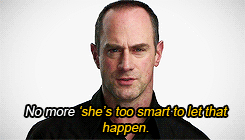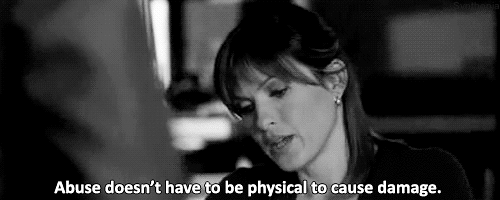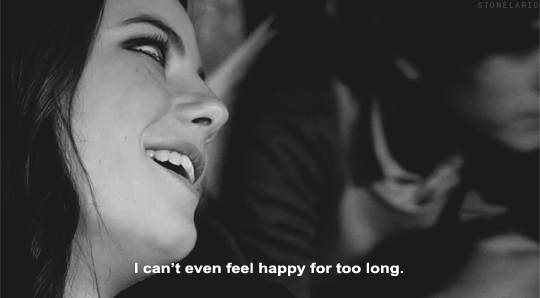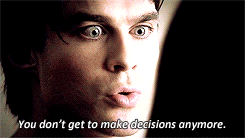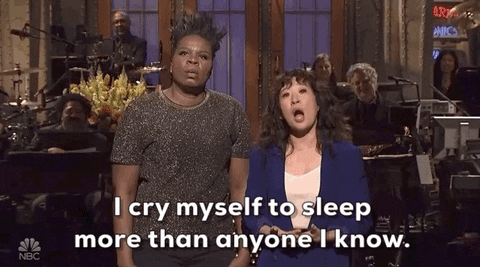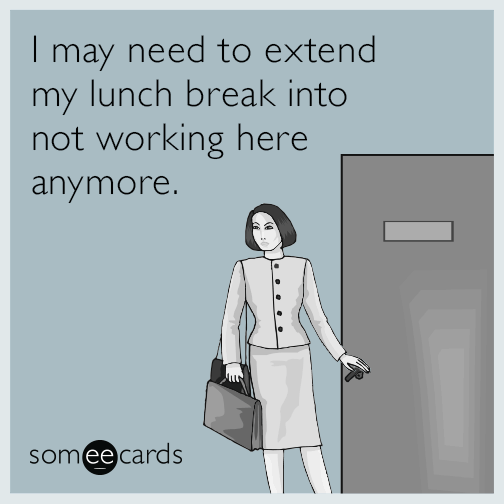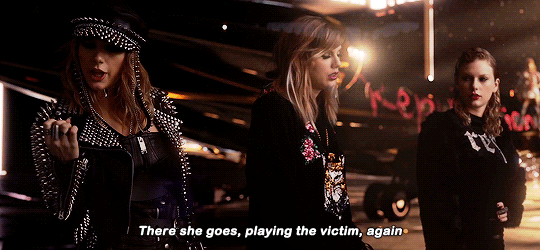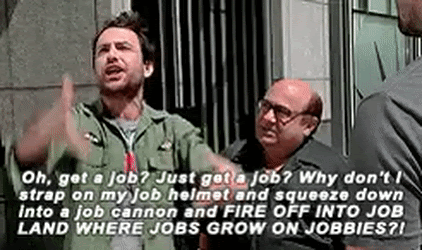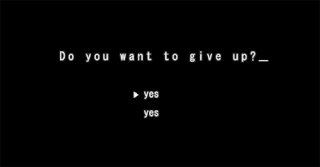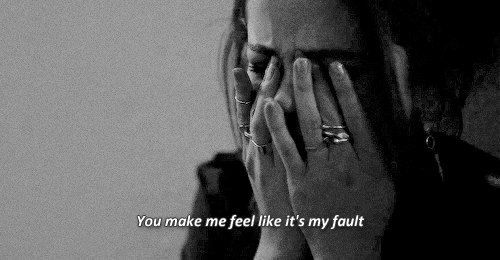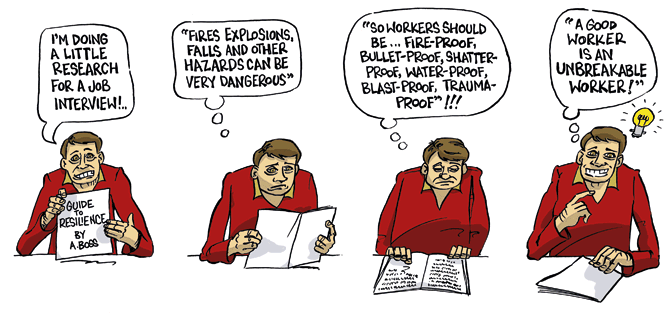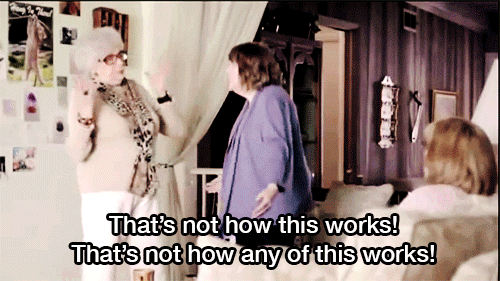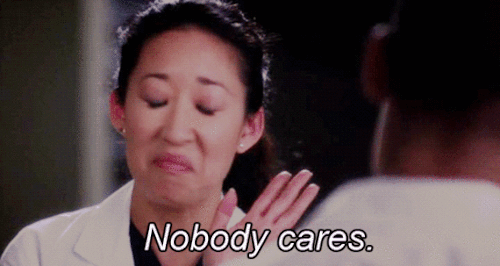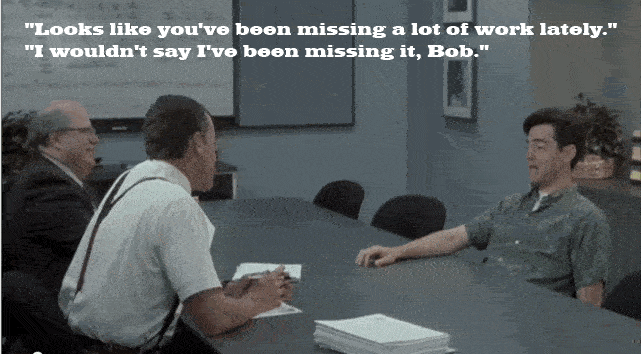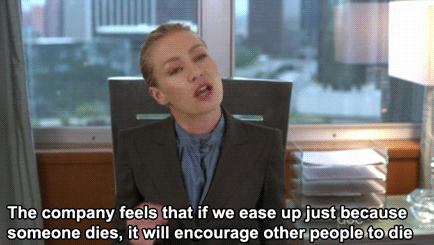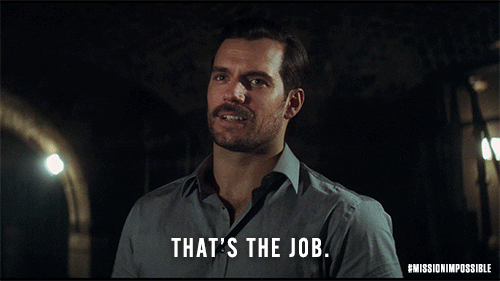Our relationships with abusive workplaces
[Estimated reading time: 25 minutes]
People... I’m not a fan of capitalism. Shocker, I know. There are a great many reasons that I dislike capitalism. But the one I want to talk about today is to do with workplaces and mental health. Because I have a theory about work. I reckon in the next few years or so, we’ll start to recognise that workplaces cause and contribute to trauma. I think we’ll start to recognise it in the same way we started to recognise it in relationships - slowly, and with an evolving social narrative.
As it is, we’re just starting to have serious conversations about what is and isn’t cool to do at work. And I don’t just mean outdated HR videos about not feeling up Susan from Accounts. I mean we’re actually starting to hold people accountable for their behaviour. Even older, more conservative people are learning to call out certain behaviours that they wouldn’t have recognised as problematic twenty years ago.
These days we’ve mostly accepted sexual assault and physical harassment as unacceptable. But we’re still figuring out the invisible things. All the shit that can’t be measured, photographed or pointed to on our own anatomy.
We seem to be under the impression that workplaces exist in a pocket dimension, outside our standards for the rest of the world. A lot of the shit we consider to be acceptable or unavoidable in the workplace is stuff we would immediately recognise as abusive if we put it in any other context.
Power Dynamics
I struggle with emotional regulation. When I’m happy, I tend to be loud and excitable and take up a lot of space. When I’m sad, I want to isolate myself and avoid verbal communication. This obviously makes it hard for me to function in a lot of workplaces. I have said to therapists in the past that it feels like workplaces are spaces where you’re only allowed to show feelings within a range of about 4 to 6. You can be a little bit flat, but you can’t be lethargic. You can be happy, but not overly excitable. You can be very mildly annoyed but never, ever angry.
However, as my career has evolved I’ve realised certain people seem to be permitted more emotional range. Many of my workplaces have seemingly tied emotional range to organisational hierarchy. The higher up you are, the bigger the range of emotions you’re allowed to display. And obviously, like everything else, it also intersects with the amount of privilege you have.
If Simon talks to his employee, Todd, there’s an implied rule that Simon is allowed to take a bit of a ‘tone’ with Todd. Most of us have seen extreme examples of this before; some asshole manager who humiliates, degrades, or abuses a staff member (special shout out to literally anyone who has worked in hospitality).
But let’s ignore the obvious examples, the ones that could be used in an HR webinar. Let’s look at the times where the behaviour is too subtle to report to anyone, but that contribute to a shitty workplace.
Andy* told me about a meeting she was once in with the director of her organisation. While Andy was explaining something to everyone in the room, the director rolled her eyes and started making talking gestures with her hands.
This isn’t the obvious kind of behaviour that belongs in an HR video, is it? In fact, on the surface it sounds a bit silly. The sort of thing that, on paper, could turn out to just be a joke between the people in the room. Definitely not the sort of interaction Andy felt she could report to anyone, that’s for sure.
But let’s reframe it - imagine now that it was the company director talking, and Andy who rolled her eyes and made the gesture, while everyone was watching. Doesn’t feel quite the same does it?
Most of us can point to a time where someone has said or done something that made us feel like shit. And for most of us, the ones that stick in our brain are the ones where we were powerless. The times where we couldn’t report the behaviour, couldn’t defend ourselves, where there were no consequences for the person who made us feel that way.
If a manager talks to a staff member in a way they wouldn’t dare talk to an executive - that’s them taking advantage of a power dynamic. Most of us, when we’re in a bad mood, don’t take it out on passengers in our train carriage, on the person in front of us buying coffee, or on someone in the parking lot. So why would it be okay to do it to someone who works for you?
We try to teach kids that ‘sticks and stones may break my bones, but words will never hurt me’ but the truth is very different. All of these small interactions can add up to something that adversely affects our health. Dr Lisa Feldman is in the top 1% most cited scientists in the world for her research in psychology and neuroscience. She points out that,
Over time, anything that contributes to chronic stress can gradually eat away at your brain and cause illness in your body. This includes physical abuse, verbal aggression, social rejection or neglect. Simply put, a long period of chronic stress can harm a human brain. When you’re on the receiving end of sustained verbal aggression, studies show you’re more likely to get sick. If people insult you, their words won’t hurt your brain the first or second time or maybe even the twentieth. But if you’re exposed to verbal aggression continually for months…words can physically injure your brain.
For some people these situations can be reminiscent of relationships with parents, particularly if they’ve experienced abuse. Not everyone had abusive parents. Lots of parents manage to tell their children off, tell them they’re wrong, or tell them they need to work harder or put in more effort, without ever approaching the line of abuse. But at the same time most children have an inherent understanding of what happens if you ‘answer back’ or don’t agree with the person in charge.
As with parents, this power dynamic exists because the employee relies on the person above them to survive. If they upset or irritate their superior it could be the difference between financial stability and unemployment.
Of course, firing people without just cause is illegal. We all know that. But many organisations understand that in order to successfully pursue a ‘wrongful termination’ case, you need the money, energy and time to actually fight it. Most people don’t have any of these things, because they need to immediately focus on finding employment to have an income again.
Unlike parents, most managers don’t see themselves as responsible for the wellbeing of their staff. They might be aware of their requirement to provide a safe workplace and any related legal obligations. But that’s not an awareness of the power dynamic. That’s not internalising the understanding that your staff will tolerate abuse from you because they may not have other options.
Just leave
We’ve all heard it before.
“Why didn’t she just leave him?”
“Why doesn’t he just walk out?”
“Why do they stay?”
We’re getting better at recognising this narrative as victim blaming. We’re getting better at understanding the complicated factors involved in keeping people in abusive relationships. But we’re not as quick on the uptake when it comes to work.
When someone talks about the shit they’re copping at work, when they complain about unfair business practices, or unethical behaviours, they’re often be met with a “Why don’t you just quit then?”
When you spend all day putting up with shit, feeling miserable, or just generally being unhappy, the last thing you’re motivated to do at the end of each day is think about more work. You’re most likely exhausted by working your regular hours and don’t have the energy to look for a new job by the time you get home.
As anyone who has ever applied for a job can tell you - it takes a lot of fucking work! Putting together an updated CV, contacting references, tailoring each application to selection criteria, and writing individualised cover letters. And on top of that, it’s not like anyone teaches you how to do any of this properly.
You just have to hope that whatever random CV template you’ve chosen is still the choice du jour of hiring managers in your industry. You don’t know how the person reading your application likes information to be laid out. You’re taking shots in the dark that the way you’ve put your paperwork together appeals specifically to the right person at the right time. And even then you might miss out just by not having a male enough or white enough name.
Abusive behaviour
All of this is worse if you’re in a job where you’re being made to feel like you’re incompotent or ineffective. Much like an abusive relationship, people in abusive workplaces often start to believe they really are incompetent, useless and unhirable. If they spend 40 hours a week being made to feel like a burden, it’s not long before they’ll internalise that message. Most of us don’t need much of a nudge in that direction - imposter syndrome is a common enough experience that combined with a lack of positive reinforcement, or even indifference, we’ll be questioning our value in no time.
In order to avoid the risk of an unfair dismissal claim, some workplaces will instead ‘manage out’ staff they’re unhappy with. If you’ve never heard of being ‘managed out’ it’s basically the workplace equivalent of that partner who cheats on you so you’ll break up with them because they can’t do it themselves. Managing someone out means making someone’s working life miserable enough that they quit. Most places do it in a way that’s completely legal and so that by the time you realise what’s happening it’s too late to document it and make a case.
Greg* was working at a large, national business when he was managed out. His editor decided she didn’t care for his personality, so she started covering his work with editorial notes about all the things he was doing wrong. When Greg compared his notes with his colleagues’ work, they all saw how unfairly she was treating him. But none of them had the power to do anything. Eventually Greg’s editor succeeded in getting him fired for ‘poor performance’ despite his work being the same standard as the rest of his team.
Managing people out can include things like cutting shifts back or scheduling someone to work at times they know are disruptive. Giving someone the type of work that no one else wants to do, or that they’re not competent at or fully trained for. And sometimes it can include things like social ostracisation or bullying tactics.
Like abusive relationships, abusive workplaces will often make promises to improve. They’ll make fun, tokenistic efforts to boost morale that do fuck all to address systemic issues. Like a spouse buying their partner gifts after hitting them, an abusive workplace will host pizza lunches or lavish end of year parties, or workplace training. But they sure as shit won’t seek to improve working conditions or provide staff with more resources so they’re not overworked.
The ‘Resilience’ gaslighting strategy
A lot of organisations these days like to use the word ‘resilience’. For anyone who has been through any kind of trauma recovery therapy, this is eye twitch inducing. Resilience, as it’s used in therapy, is about our capacity to recover from trauma based on support received. A lot of businesses are using it to refer to your ability to avoid ‘burnout’. This is actually pretty fucked up on a number of levels, most of which comes down to it being the work equivalent of gaslighting.
The Australian Psychology Society has this to say on the idea of resilience as a preventative for burnout:
“Resilience...has its limits when it comes to preventing burnout – a syndrome characterised by chronic exhaustion, cynicism and inefficacy. Simply put, improving resilience is helpful but not sufficient to address factors that are integral to aggravating and sustaining burnout.”
If you haven’t found yourself Googling ‘burnout’ at 2pm on a Tuesday, let me save you some time. The six main risk factors for work burnout are:
having an overwhelming workload
limited control
unrewarding work
unfair work
work that conflicts with values
and a lack of community in the workplace.
Kind of seems like a lot of those factors are outside the control of the individual, right? Almost like they’re things the workplace would have more control over? Yeah. Using the concept of resilience as a preventative for burnout basically lets businesses ignore the role they play in creating an unsafe environment. It puts all the responsibility on staff to not become ‘burned out’ by ‘being resilient’ instead of on the workplace to look into why staff are burning out and addressing it.
Journalist Anne Helen Petersen put it succinctly in her article on millennial burnout,
“Why am I burned out? Because I’ve internalized the idea that I should be working all the time. Why have I internalized that idea? Because everything and everyone in my life has reinforced it — explicitly and implicitly — since I was young.”
Even better, because the term ‘resilience’ has such positive associations, where it makes us think of strong, stoic individuals weathering hardship like a comic book hero, it’s subliminally ensuring that we’re less likely to put our hand up if we’re struggling. No one wants to think of themselves as ‘unresilient’. This is a message a lot of us, but especially People of Colour, have internalised.
The other thing that’s super fun is the fact that this ‘resilience’ is often being taught through the principles of ‘positive psychology’. Aside from the fact that Positive psychology was pioneered by a guy who literally tortured dogs to prove a point and ended up inspiring the CIA’s torture program, the whole premise behind it isn’t great either. By focusing on positivity it reinforces the idea that there are only certain emotions you’re allowed to display at work. And if you’re not displaying them, then that’s your personal failing, because positive psychology teaches you that your wellbeing is your responsibility.
Which is fine up to a point. The same way your health is your own responsibility - if you have diabetes, your workplace isn’t responsible for providing you with insulin. But if your employer is making your diabetes worse by not providing you with time to eat or check your blood, then yeah, that’s on the workpalce.
Training focusing on building ‘resilience’ is about gaslighting people into believing the stress from their work is solely their problem to address and has nothing to do with the workplace. And the best part is, it doesn’t even achieve what they want it to! Jonathan D. Quick, an instructor in medicine at Harvard Medical School and a co-author of the book “Preventive Stress Management in Organizations points out,
“The evidence is clear that despite the rationalizations some leaders may use to defend their stress-inducing, unsupportive style, such behavior by leaders does not contribute to improved individual performance or organizational productivity.”
The Mental Health Literacy Problem
Most of us have, at one stage or another, been in a relationship with someone who was more mentally fucked up than ourselves. Sometimes this isn’t too bad - a person who has trauma but is working through recovery usually has the self-awareness to limit problematic behaviours. However the people who have mental health issues, but lack awareness of these issues and aren’t getting help - those are the people who make their mental health issues everyone else’s problem. Managers, employers, bosses - all of these are people who are just as susceptible to mental illness and ill-health as the rest of us. But if they have an undiagnosed disorder or unaddressed behavioural issues it can lead to them abusing, manipulating or harassing the people who work for them. And most workplaces have no systems in place to address it.
Just like relationships, we all carry our own experiences and traumas from past workplaces into new ones. If we learn in one job that our survival depends on one thing in one job, we’re not going to forget that the minute we start a new job. In almost any other situation, we’d encourage a person with trauma to take time to recover and address their issues. But in the workplace - we’re expected to resolve our issues overnight and start a new job with a blank slate.
Some workplaces genuinely want to accommodate people with mental health issues, including those incurred from previous bad work experiences. The problem is most of this relies on people’s ability to advocate for themselves. Basically you need to be self-aware enough and have enough trust in your workplace, to step up and say “Hey, I am experiencing this and I need that in order to feel safe or productive.”
Two problems with this. One, self-awareness is not an overnight thing. Usually it takes years of therapy and introspection, which as we’ve discussed before, isn’t something everyone can access. And two, it requires a good enough understanding of both yourself and your work environment to be able to identify what you need to address your issues. As someone who has spent the better part of thirty years in therapy, I still can’t tell my workplace what I need for them to help me with my depression. Because I honestly don’t know what would help.
When someone can’t advocate for themselves, or has learned not to from an abusive workplace, shit can go sideways even in a place that wants to provide support.
Max* has severe anxiety. Sometimes this means they can’t leave their house. This is obviously kind of an issue when they need to go to work. After having shitty treatment in past workplaces, they learned not to disclose their anxiety. On days when Max struggled to get out of the house, they would tell people the trains were late or something similar. Of course, there are only so many times you can use those lines before you start getting performance managed for being late.
But guess what happens when someone with anxiety starts getting performance managed for something that’s already out of their control? Yeah, it doesn’t make the anxiety better, that’s for fucking sure. And it also adds to the ongoing baggage of ‘workplaces that have fucked me over’ which means at the next job, when Max starts to get anxious, shit spirals that much quicker and more severely.
Paying for it
The crux of the issue, of course, is capitalism. A workplace is not a person. It is a business. It does not seek human connection, it seeks profit. And the people who work within it are being managed, by the people above them, with that goal in mind. They’re not trying to create the happiest workforce, they’re trying to create the most productive one. And ultimately while a happy staff member might be more productive, it’s usually easier to replace someone than to repair them emotionally.
Most workplaces want to get the most amount of work (or profit) from their staff, without dealing with consequences for breaking the law. Like the old Chris Rock joke, “Minimum wage means they would pay you less, if they were legally allowed to.” Keep in mind that child labour laws exist because otherwise businesses have no moral issue exploiting children for profit (just look at the brands who have resorted to offshore production to get around these laws).
There are lots of ways workplaces manipulate their culture to ensure they get the most ‘value’ from each employee. Creating expectations for to work while sick, or rewarding people who work back late. In a healthy workplace, someone working late is asked if they have the resources they need to complete their workload - they’re not rewarded with a promotion and more work. People who are sick are told to GTFO because that’s gross and sickness normally goes away quicker if you take time to recover. And yet, many workplaces carried on as usual with this bullshit, even during a global fucking pandemic.
But hey, it’s all totally normal
The fucked up part of all of this is the social insistence that this is normal and just part of life.
Most of us will have at least one horror workplace in our lives, but it’s pretty unlikely we’ll receive the same support or empathy we would if it was a more conventionally recognised abusive relationship.
It’s not uncommon for people to lose sleep due to workplace stress, for people to have relationships fall apart, to develop mental illness or physical health issues from stress. Some people still have nightmares and traumatic flashbacks from workplaces years after they’ve left. We aren’t talking about how work is affecting our mental health, or how we’re spend around 40 hours a week in spaces not designed with our physical or mental wellbeing in mind.
But maybe we fucking should be?
That is all.
You may go now.
*Obviously not their real names, because their real names are way more awesome.
